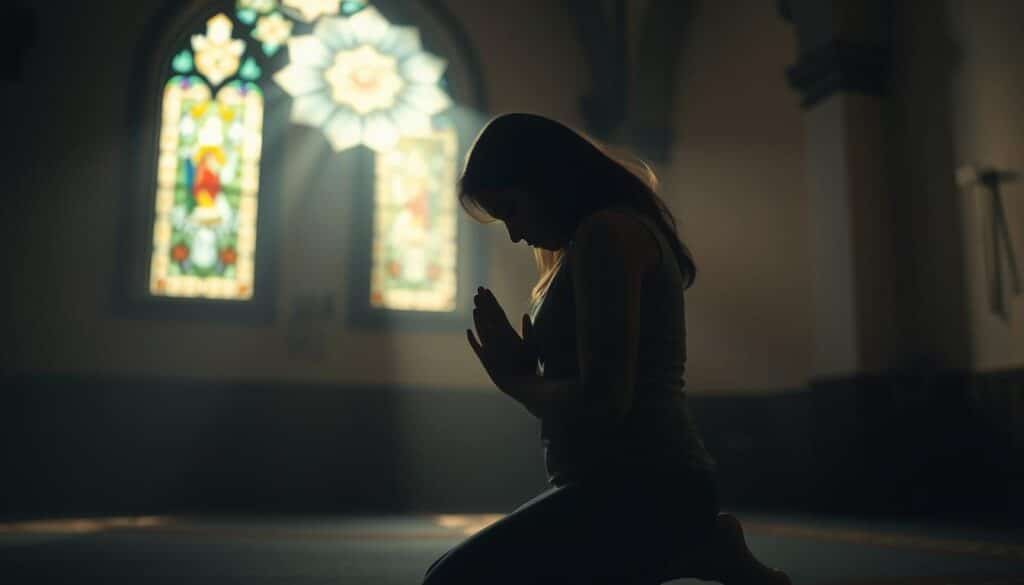In today’s fast-paced world, finding peace with prayer reflection is crucial. This guide will show you the power of prayer in spiritual growth and inner peace. It helps you understand yourself better and improve your daily life.
With simple tips, this guide is perfect for anyone looking to add prayer reflection to their life. It’s all about nurturing your mental well-being.
The Importance of Prayer in Achieaching Peace
Prayer is essential in our lives, connecting us with the divine. It brings stability and direction, especially when times are tough. Embracing prayer can help us find peace in our chaotic, uncertain world.
Anúncios
Understanding the Role of Prayer in Daily Life
Prayer makes us resilient and adaptable when added to our daily routines. It strengthens our connection to our beliefs. This foundation helps us face challenges with grace and determination.
By praying, we express our intentions and thanks. This brings comfort and improves our well-being.
How Prayer Provides Comfort During Hard Times
Prayer is a source of comfort in tough times. Scriptures, like Philippians 4:6–7, show how prayer can turn anxiety into peace. It helps us let go of our worries and find relief.
When facing obstacles, prayer soothes our spirits and gives us the strength to overcome them.

Understanding Prayer Reflection
Prayer reflection is a key way to deepen one’s spiritual life. It focuses on thoughtfully evaluating how one communicates with the divine. Unlike just asking for things, its purpose is to foster personal growth and a deeper faith understanding.
Defining Prayer Reflection and Its Purpose
Prayer reflection has deep value. It allows people to pause from daily life and think about their thoughts and feelings. This can lead to discoveries about personal challenges and blessings, growing spiritual awareness.
The Difference Between Prayer and Prayer Reflection
Understanding the difference between prayer and prayer reflection is crucial. Traditional prayer is often spontaneous, a direct talk of thoughts and needs. Prayer reflection, however, involves careful thought, enriching one’s faith connection.
Biblical Foundations for Prayer Reflection
Exploring the Bible for prayer insights helps believers communicate better with God. Many verses encourage us, showing prayer’s power during tough times. These teachings help us see how prayer reflection changes our spiritual path.
Scriptural References to Encourage Prayer Reflection
For example, Philippians 4:6-7 urges us to share our worries with God and be thankful. This helps us find peace and grow closer to God. Jesus’ own prayers, especially when He was alone, show us how to reflect in prayer.
Lessons from Biblical Figures on the Power of Prayer
Looking at David and Paul, we learn much about prayer. David used prayer in his struggles, and his psalms show us how to talk openly to God. Paul’s letters show his ongoing talks with God, reminding us that prayer can give us strength when we face problems. Their stories give us powerful examples of prayer for our own lives.
Seven Practices for Effective Prayer Reflection
Improving your prayer life means adopting strategies that connect you more deeply with the spiritual. These seven tips can change how you pray. They make your prayer life regular, help you focus better, and support your personal journey.
1. Establishing a Regular Prayer Routine
Setting up a prayer routine adds consistency. It sets aside daily time for connecting with God. This organized method enriches your experience, making each prayer moment special.
2. Creating a Sacred Space for Prayer
Having a special place for prayer is key. Choose a quiet spot in your home with few distractions. This peaceful setting will help you concentrate and connect more deeply with your prayers.
3. Journaling Your Prayer Reflections
Journaling your prayers captures your thoughts and feelings. It tracks your spiritual journey, showing how your reflections change over time. This practice boosts your self-awareness.
4. Utilizing Scripture in Your Prayer Reflections
Using Scripture in your prayers can deepen your insights. Reflecting on biblical passages offers guidance. It makes your prayer time more impactful.
5. Practicing Gratitude During Prayer
Being thankful in prayer helps focus on blessings instead of problems. This shift creates peace and happiness in your life. It shows the power of a thankful heart during prayer.
6. Engaging in Meditation and Contemplation
Meditation and contemplation make your prayers more profound. They offer quiet time to hear God’s voice. These practices strengthen your bond with Him.
7. Seeking Community Support for Prayer
Joining a prayer community brings many benefits. It encourages accountability, spiritual growth, and shared insights. Praying with others enriches your spiritual path.
Finding Peace Through Prayer Reflection
Prayer reflection is a powerful way to find inner peace. It involves deep talks with oneself or a higher power. This process brings clarity and calmness.
Reflecting during prayer helps ease stress and worry. Studies show regular prayer improves mood and lowers distress.
How Prayer Reflection Facilitates Inner Peace
Prayer reflection can change lives. It helps people understand their challenges better. And it allows them to express their thoughts and feelings.
This leads to emotional healing. Spending time in prayer offers insight. It strengthens resilience and nurtures peace.
The Connection Between Prayer and Mental Well-Being
Studies show prayer benefits mental health. It builds a sense of connection with others or a higher power. This helps improve mental health.
Through prayer, people find emotional stability. They gain a balanced view of life. This journey enhances psychological wellness.
Practical Tips for Starting Your Prayer Reflection Journey
Starting to reflect through prayer is both a path to personal growth and spiritual awareness. It’s key to carve out dedicated time for this practice. When obstacles pop up, it’s important to know how to deal with them to keep a steady prayer life.
Setting Aside Time for Prayer Reflection
Choosing the best time for prayer can deeply affect your experience. Here are a few tips to help establish a prayer routine:
- Choose a specific time each day, whether in the morning, evening, or during breaks.
- Set a reminder on your phone to create a habit of time for prayer.
- Create a calming atmosphere by finding a quiet space where you won’t be disturbed.
Overcoming Obstacles to Maintain a Prayer Life
Many face challenges that may slow down their prayer journey. Tackling these issues is crucial to stay committed:
- Identify common distractions, such as social media or television, and minimize their impact during prayer time.
- Acknowledge emotional barriers that may affect your willingness to pray, and approach them with patience and understanding.
- Consider joining a group where prayer is shared to find support and encouragement.
Incorporating Gratitude in Your Prayer Life
Making gratitude a part of your prayer can change how you see life. Saying thanks helps us view our experiences differently. This positive shift can make every day feel rich and full of growth chances. Being thankful often leads to greater happiness and strength.
How Gratitude Changes Your Perspective
Gratitude in prayer changes how we feel about our days. It makes us focus on what we have, not what’s missing. This helps us find joy in the little things. We start to see tough times as ways to grow, not just barriers.
Practical Ways to Cultivate Thankfulness
Here are some ways to bring more gratitude into your prayers:
- Maintain a Gratitude Journal: Dedicate a few minutes each day to write down things you are thankful for.
- Make a List During Prayer: Regularly include specific items you appreciate in your prayers for focused gratitude.
- Share Gratitude: Communicate thankfulness with those around you, which amplifies positive feelings.
- Visual Reminders: Place notes of appreciation in visible spaces to remind you of your blessings.
Creating a Prayer Journal
A prayer journal can make your spiritual life richer. Writing down your prayers has many benefits. It makes your thoughts clearer and helps you reflect deeply. By jotting down your feelings, insights, and special moments, you can see how much you’ve grown spiritually. This guide gives you tips to keep a prayer journal that makes your faith journey more meaningful.
Benefits of Writing Down Your Prayers
Writing your prayers down is a powerful way to understand yourself better and process your emotions. By keeping a prayer journal, you get several benefits:
- Clarification of thoughts and feelings: Writing helps make your spiritual questions clearer.
- Tracking spiritual growth: You can see how your prayers are answered and reflect on your faith journey.
- Enhanced focus during prayer: Writing your prayers helps you focus better and connect deeper during prayer times.
Tips for Keeping an Effective Prayer Journal
Here are tips to get the most out of your prayer journaling:
- Choose a dedicated notebook or digital space: Pick a recording method that’s comfortable for you.
- Establish a consistent writing routine: Making time for journaling regularly helps you stay committed.
- Include scripture and reflections: Add verses that mean a lot to your prayers to understand them better.
- Reflect on answered prayers and evolving thoughts: Look back at your entries to see your spiritual growth.
Understanding the Peace of God
The peace of God brings a deep sense of calm that goes beyond usual worries. It’s about more than just wanting to feel calm. It involves connecting deeply with the spiritual and divine. Praying for peace helps bring this calm into our daily lives.
What is the Peace of God?
The peace of God is a special kind of calm that comes from connecting with something greater than ourselves. This peace lets us know that everything is under God’s control. It comforts us during hard times, making us feel supported and not alone. It’s key for getting through tough situations with grace and confidence.
How to Experience Peace Through Prayer Reflection
Starting to feel God’s peace often comes from prayer reflection. Below are some methods to aid this journey:
- Silent Contemplation: Spend quiet time to hear God’s voice and welcome His peace into your heart.
- Scriptural Meditation: Think about Bible verses about peace, letting them touch your soul.
- Gratitude Practices: Write down what you’re grateful for during prayer, creating a thankful heart that can bring peace.
- Intercessory Prayer: Pray for both your needs and others, building a community feeling that promotes peace.
Adding these practices to your life can help you feel and understand God’s peace. This leads to a richer spiritual life.
Challenges in Maintaining a Prayer Reflection Practice
Many people find it tough to keep up with prayer. It’s easy to get sidetracked or feel down because of the hurdles. Knowing these challenges can help strengthen your prayer habits.
Common Struggles with Prayer Consistency
A lot of us struggle to pray regularly. Here are some reasons why:
- Time constraints due to busy schedules.
- Lack of motivation or feeling overwhelmed.
- Feelings of inadequacy or confusion about how to pray.
- Emotional states that may inhibit focus.
Identifying and Addressing Distractions
When praying, distractions can come from many places. To deal with them, try these tips:
- Create a dedicated prayer space that promotes focus.
- Set specific times for prayer to build a routine.
- Limit technological interruptions by turning off devices.
- Practice mindfulness to calm the mind before praying.
Personal Stories and Testimonials
Exploring personal stories shows how reflecting on prayer changes lives. People share how prayer helped them find peace in hard times. These stories inspire us, showing how prayer can heal and help us grow.
Real-Life Experiences of Finding Peace Through Prayer
Many stories tell us about finding calm in tough times through prayer. People talk about moving from stress to peace with prayer’s help. These stories show us that reaching out to a higher power brings peace inside.
How Others Transformed Their Lives Through Prayer Reflection
Prayer does more than bring peace. It changes how we act, think, and connect with others. Reflecting on prayers, people felt stronger and found new goals in life. Their stories prove that prayer can truly change us, leading to a better life.
Conclusion
The journey of prayer reflection helps us find inner peace and grow spiritually. By looking at the insights in this guide, it’s clear. Consistent prayer reflection brings us closer to God. It’s like a safe place when life gets tough. It’s important to have a routine to make our spiritual lives richer.
Embracing these practices deepens our faith and brings peace to our hearts. Feeling thankful and having support from others make our journey better. We’re reminded we’re not alone in our reflections. Making time for this sacred practice can change our lives.
The key message here is to be intentional with our prayer lives. By doing prayer reflection, we welcome blessings. Let this guide inspire you to deepen your spirituality. This leads to lasting peace and happiness.
FAQ
How can prayer reflection enhance my spiritual journey?
What are some practical steps to start a prayer reflection practice?
How does prayer reflection contribute to mental well-being?
Can you provide examples of biblical figures who practiced prayer reflection?
What challenges might I face when establishing a prayer reflection practice?
How can expressing gratitude through prayer impact my perspective?
Why is maintaining a prayer journal beneficial?
What is meant by the “peace of God” in the context of prayer reflection?
How can a supportive community enhance my prayer reflection experience?
Conteúdo criado com auxílio de Inteligência Artificial



